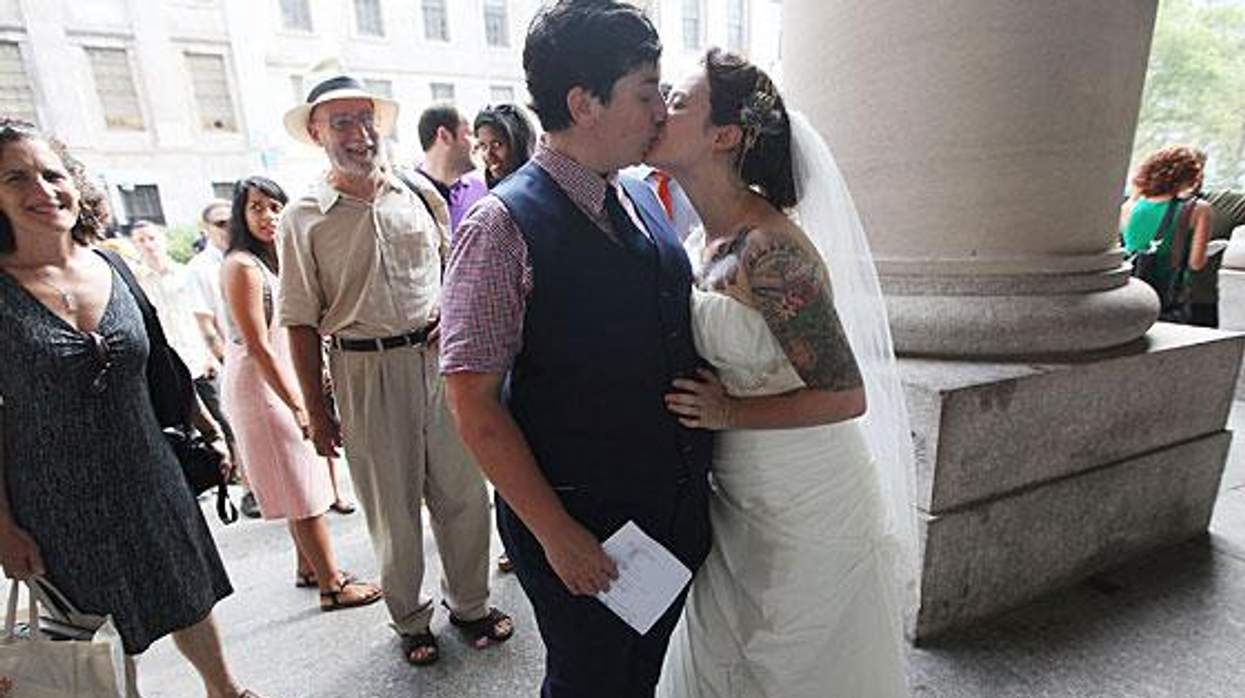Next April, as the cherry blossoms are flowering across the city, I will stand in front of my family and friends and make a public promise of lifetime fidelity and commitment to my partner of five years. We want to take part in the tradition of marriage because we take its vows seriously and hope that the closest people in our lives will both hold us accountable to those words and support us in our relationship as life doles out the "for better or worse."
But if you ask people who are still struggling with whether they support allowing gay couples to marry, they are just as likely to believe that I want to marry in order to get "rights and benefits like tax advantages, hospital visitation, or sharing a spouse's pension," rather than to publicly acknowledge lifetime commitment. Why? Because that's what many in the movement have been telling them for so many years--and they listened.
After conducting extensive research on Americans in the middle, Third Way believes that correcting this misperception is the number one thing we can do to solidify support for marriage across the country. And a vital part of that effort must come in shifting our own advocacy from the language of rights to the language of commitment.
There are three reasons that setting aside the rights argument in favor of talking about lifetime commitment is crucial.
First, most Americans don't think about their own marriages in terms of rights. Although marriage provides important protections for families, the institution and the ideal of marriage transcend spousal Social Security benefits or joint tax filing. When asked to describe marriage in their own words, people in the middle use words like "commitment," "responsibility," "fidelity," and "a big step." And when contemplating why couples like themselves get married, they overwhelmingly say it's "to publicly acknowledge their love and commitment to each other." The description of marriage that Americans most frequently cited in another round of our research was "a lifetime commitment between two people through good times and bad." There is a stunning consistency among these responses--and the shared theme is commitment, not rights.
Secondly, understanding that gay couples want to marry for similar reasons as other couples do--to make a public promise of lifetime commitment--drives support for allowing us to do so. Those who thought gay couples marry for commitment in our most recent poll were substantially more likely to support allowing those couples to marry; in fact, a whopping 3/5ths supported marriage, while 3/5ths of those who believed gay couples marry to get a basket of rights opposed it.
Third, if we continue to identify a lack of rights as the problem, civil unions may continue to be the answer for many in the middle. While there are differences between the rights afforded by state civil unions and marriages, continuing to argue that what we're after is the 1138 federal rights of marriage gives those who aren't comfortable with allowing gay couples to marry an easy out. We've heard it over and over again: "Give them all the rights of marriage, just don't call it marriage." And if we're asking for rights, why wouldn't we be satisfied with that answer?
Instead, using a framework of commitment shows what is really at stake. It isn't about pensions or tax forms--it's about joining the tradition that plays such an important role in American families, communities, and society. It's about making those solemn vows in front of the people you care most about, promising to be faithful to your partner for the rest of your life. And it's about having your friends and family pledge to support you in that sometimes difficult task. Those deeply personal, admirable, and incomparable promises just can't be approximated with some made-up legal category.
This week, Third Way is launching a Commitment Campaign to help deepen support for marriage among those in the middle by persuading them that gay couples want to marry to make a lifetime commitment, not simply for rights and benefits. We'll work with policymakers and advocates in states with marriage legislation and ballot initiatives, aid in the efforts to repeal the Defense of Marriage Act at the federal level, and help to build public support for marriage to prepare for a possible Supreme Court decision on the issue. The Commitment Campaign already has the bipartisan support of prominent political leaders and activists including Maryland Governor Martin O'Malley (D), former Republican National Committee Chairman Ken Mehlman, Senator Kirsten Gillibrand (D-NY), Rhode Island Governor Lincoln Chafee (I), Congressman Jared Polis (D-CO), and former New Jersey Governor Christine Todd Whitman (R), among others. Our hope is that by shifting the focus to commitment, we can correct the misperception about why gay couples want to marry and hasten the time when committed gay couples across the country will be able to make those precious vows.
Lanae Erickson is the Deputy Director of Social Policy & Politics at Third Way, a moderate think tank in Washington, D.C.




































































Charlie Kirk DID say stoning gay people was the 'perfect law' — and these other heinous quotes